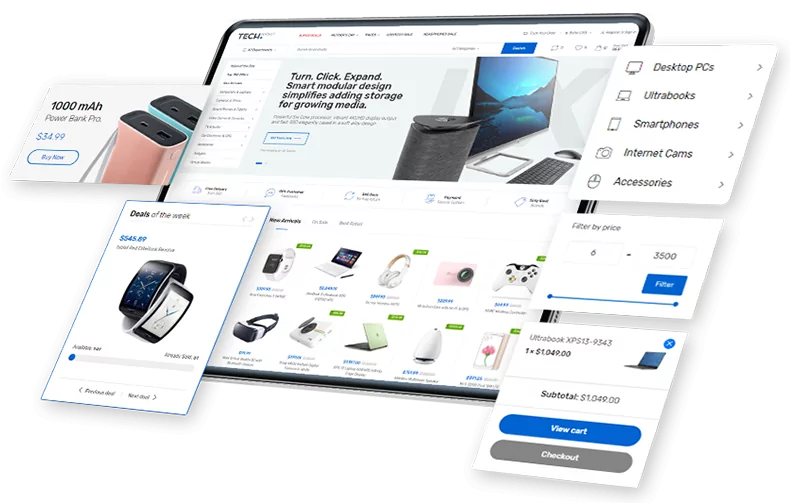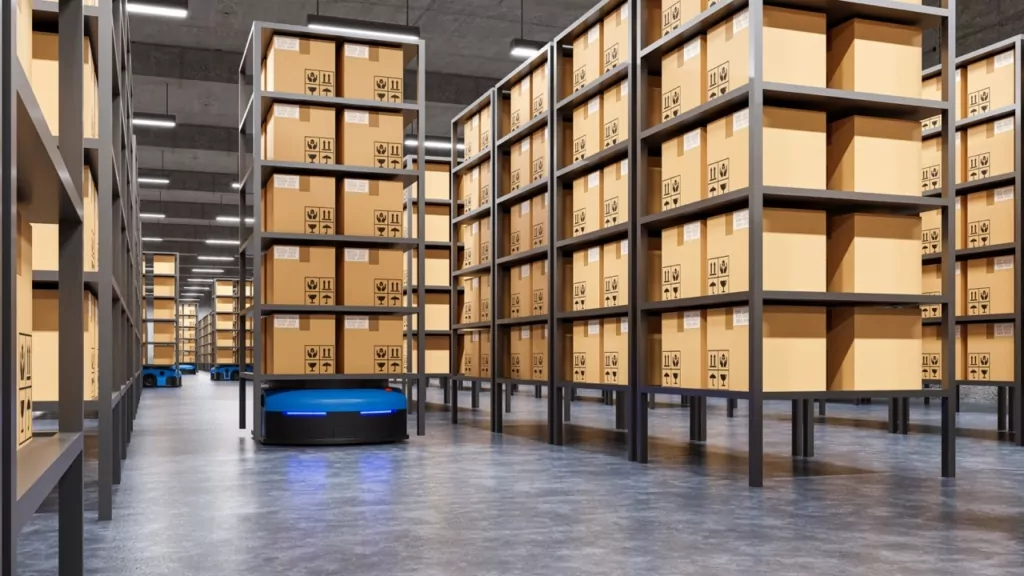Tabla de contenido
[zoomsounds id=”why-online-store-owners-should-connect-to-amazon-and-what-benefits-will-fba-bring-to-them”]
There is no denying the importance of Amazon and FBA. In actuality, 200 million distinct customers each month prefer Amazon marketplace over any other online store owners when completing purchases. Apparently, small and medium-sized online store owners sold roughly 4,000 things every minute in 2019. These figures make it clear that every shop ought to at the very least think about putting their items on Amazon.
For online store owners, it’s a tremendously appealing sales channel. However, each shop will have different outcomes, and what works for few online store owners might not necessarily work for others.
What is an Amazon store?
An Amazon storefront is a brand’s home on Amazon, to put it simply. It is a personalized, multipage shopping destination where unique firms may tell their stories and present their products. Online store owners must register with the Amazon Brand Registry in order to sell on the FBA marketplace. By doing this, the specific seller will be allowed to open a special Store on the FBA platform without paying any additional fees. The registered vendor is furthermore given a special Amazon URL.
Amazon is helping its registered sellers do more business on its Amazon platform

Many people may be amazed to learn that Amazon helps its sellers by introducing new methods and regulations, despite the fact that it allows online store owners to sign up for a free account and launch an online store. One of the notable developments in this area is Amazon’s expansion of its third-party suppliers’ access to eCommerce functionalities. The creation of an FBA store has additional advantages.
Fees for sellers on Amazon marketplace
The price of retailing on Amazon will vary depending on the marketing program used. The Individual and Professional subscription packages are the two that are offered.
Individual Seller Plan features include:
- No monthly subscription fees
- $0.99 fee for each item sold
- Variable closing fees that vary by category (ranging between $0.45 to $1.35)
The Professional online store owners plan has:
- A monthly subscription fee of $39.99
- Referral fees on each item sold (ranging from 6% to 25%, averaging 13%)
- Variable closing fees that vary by category
Fulfilled by Amazon (FBA)
You may save a tremendous amount of time by selecting fulfillment by Amazon.
You just need to bring your inventory to the designated Amazon Fulfillment Center, which is essentially an Amazon warehouse, in order to have your items shipped as an Amazon FBA seller. Your goods will be kept after delivery until they are sold. You retain ownership of your products and management of the quantity of merchandise you send to the fulfillment center.
The remainder is handled by FBA. Your Fulfillment Center will handle every step of the shipping process for you as soon as you sell a product and it has to be delivered, from generating shipping labels and securely wrapping things to processing returns from consumers who change their minds.
The FBA service takes care of the greatest headaches associated with fulfillment, making it a particularly good choice for small enterprises and lone sellers with limited resources. You may save time and concentrate on marketing, producing, or locating high-quality items only by paying fulfillment expenses.
Additionally, FBA items are instantly eligible for Prime, which might help you draw in additional customers who are devoted Prime members. Additionally, they are marked as “Fulfilled by Amazon” items, which enhances your online reputation and makes you stand out.

Online Store that sells!
Do you need a redesign or a new website for selling online?
Complete solution for retail and wholesale. Great UX/UI designers, experienced programmers and high emphasis on testing. If you are looking for a professional partner for your business in the online world, contact us!
Fulfilled by Merchant (FBM)
The alternative is fulfillment by the merchant, in which case everything is handled by you. You won’t receive any guarantees that the things you buy will be Prime-eligible, and Amazon won’t assist in any way if you have problems with order shipment or handling product return questions.
Long delivery periods for clients may result if you don’t have a staff or vendors to assist you with the procedure. FBM is really just a terrific, cost-effective option if you have a little inventory or are sure you can handle every aspect of fulfillment on time.
FBM is still not free. Instead of choosing the least expensive choice on your own, you’ll have to pay shipping expenses through Amazon. The cost of regular domestic shipping ranges from $3.99 to $4.49 (plus $0.50/lb) per item to $46.50 per unit for expedited overseas shipping.
Considering that you can allow Amazon to handle a lot of the labor, save time, and increase consumer confidence, FBA can be worth the price, especially if you want international delivery choices.
The benefits of selling on Amazon
Many marketing study cases have been written about how FBA so masterfully managed to seize a piece of our minds and establish itself as the top destination for many buyers. Today, we’d like to examine the potential rewards for online store owners that choose to partner with the enormous colossus in their product sales.
1. Easy to get started
Although launching a product on FBA is quite simple, some product types will need more work than others. Both buyers and online store owners will find the layout to be user-friendly. And specifically for sellers, Amazon provides a variety of tools that streamline the listing process.
Those who are just beginning out on their own will need to identify and maintain warehouse space, build up their e-commerce webpage using a dependable and secure e-commerce framework, such as we love web that provides trusted services, package and ship their items when a sale has been completed, and respond to consumer queries. However, FBA already has many of these responsibilities in place.
Online store owners also have access to Amazon’s own shipping and warehousing resources through the Fulfilled by Amazon (FBA) function. Simply submit your things to Amazon, and for a charge, the business will store them and ship them to customers on your behalf.
2. More sales
Lots of active customers visit Amazon each month to do their shopping.
And the data is unambiguous: as of the end of 2019, the website had 150 Prime subscribers globally and over $280.5 billion in revenue. We can see that for the majority of shoppers, Amazon is the best option.
Each and every shop that lists its goods on FBA instantly builds reputation and confidence. This is as a result of the fact that some customers are more inclined to purchase a product from Amazon than from unknown online store owners. Many customers are persuaded to buy things from Amazon’s website by its assurance of quality and superior customer service. Since they probably enjoyed their previous Amazon purchases, the online store owners gain from it by default.
Customers in nations where internet buying hasn’t really taken off tend to trust FBA more than practically any other online store owners. Particularly now that there have been more than 100 million Alexa devices sold globally, it has become a household brand. Even voice-activated purchasing is an option for consumers and all the benefit is for online store owners.

3. The ideal platform to showcase inventory
One of the finest methods for an online store owner to display his products is to set up an FBA store. Furthermore, rather than being given in a disorganized sequence, each product is exhibited such that it can be distinguished from the others. Each product is distinct and categorized, making it simple for the consumer to recognize, locate, and buy it.
For instance, if a customer wants to buy toothpaste on FBA, the eCommerce powerhouse provides the consumer with the greatest price and a satisfying purchasing experience with the online store owners. You will notice the creative yet expert way the numerous product selections are presented for purchase when you visit Amazon and arrive at the toothpaste sales page. The toothpaste product will be categorized depending on the components that were utilized to produce it. The customer will be taken into consideration as it is further categorized.
For instance, you will see toothpaste choices for kids in the same aisle as one for elderly adults. Customers will find it simple to find what they want if this is done.
4. Amazon ranks high on search engine research pages
Amazon will almost always appear on the first page of search results when a consumer searches the internet for a good or a service. Online store owners are nonetheless happy that their FBA shop gets more virtual customers because of Amazon’s strong internet traffic.
5. International reach
Since Amazon is a well-known brand internationally, online store owners have the chance to diversify their product offers. They have the choice to expand their geographic reach beyond their immediate area and do so globally.
It’s really simple to begin selling in many areas because FBA is one of the major and most reliable global selling and purchasing platforms. Despite only having 13 country-specific websites up and running, they distribute to more than 100 nations globally. It merely depends on the customer’s willingness to maybe pay a higher delivery price dependent on their region.
When compared to the majority of shopping cart systems, using FBA to grow internationally is far simpler. Magento supports several store views, while other platforms need the creation of separate shops for every language. Without even knowing how well the product would sell in that area, that is a lot of labor.
By posting a profile on a local FBA, all online store owners may immediately determine whether his items appeal to a worldwide audience thanks to Amazon. Every element, including international order delivery and localized customer assistance, is taken care of. Since you don’t have to fuss about working out local payment methods, logistics, and operations, it relieves you of the burden.
Let’s imagine you have a US basis but want to grow in Europe. How to list worldwide is as follows:
- Choose your expansion area.
- Sign up and offer your items in that market.
- Establish a shipping and fulfillment strategy.
- Manage your company and sales using Amazon’s platform.
6. No stock
Online store owners may ship all of their items in bulk to FBA, and they will keep online store owners’ inventory, package it, and deliver it to their consumers. FBA has more than 175 fulfillment centers located all over the world. Easy!
The biggest advantage of this is that online store owners won’t have to deal with the logistics of product shipment. The online store owners may enjoy watching the orders grow while concentrating on handling other crucial company tasks.
In contrast to what online store owners would usually have to pay, Amazon FBA (Fulfillment by Amazon) will act as their stock depot, manager, and shipper for a very low fee. Their items will automatically qualify for Amazon Prime delivery and Buy Box priority, which will greatly increase the online store owners’ overall sales in addition to saving them the bother. Viewing the Prime logo is a fantastic motivator for customers.

7. Low marketing costs
You get access to the millions of customers that visit Amazon’s website every day. Depending on your expertise and how competitive the industry is, you may be able to begin selling right away without making any big marketing efforts by FBA. Customers looking for your items can simply find you because the Amazon website functions as its own search engine.
Of course, there are a lot of competitors, and the online store owners need to stand out. Having a carefully selected presence will support your attempts to use FBA’s enormous client database. Any effort you make to make your listings excellent has the potential to truly pay off.
Ways to promote your products
Sometimes your Amazon items won’t sell on their own. You must market your items both inside and outside of the Amazon Marketplace if you want to boost sales and establish yourself as an Amazon success story. Here are some pointers to aid you in getting promotions:
1. Ask for customer reviews
Many customers who are perusing Amazon listings check your product feedback to make sure what you’re selling meets their standards. Fortunately, this is simple by using Amazon Seller Central.
Simply navigate to your purchase details and click the “Request a Review” option between 5 and 30 days after an order is delivered. The request will be instantly sent to your customer by Amazon.
Don’t forget to reply to product reviews so that your consumers know you value them!
2. Invest in sponsored Ads
The online store owners may increase their platform presence with sponsored Amazon adverts. The most typical scenario for this is through a sponsored product campaign, which elevates three or more of your listings in FBA’s search results.
These are wise investments in these campaigns. For the maximum potential ROI, you may retarget consumers, reach the most pertinent customers, and manage your own budget. Additionally, your Amazon Seller Central account will allow you to track metrics.
Don’t let the chance pass you by; everybody on the professional selling plan even receives $50 in free clicks.
3. Share on social media
Advertising on social media is one of the finest methods for you to promote your items, just like in a physical store. By being where your consumers are and including links to the retail sites where they can make purchases, you can make it simple for customers to discover more about what you have to offer.
Each time you promote your items, don’t forget to include a graphic in your post. A strong visual that keeps loyal to your online identity can draw in, engage, and please clients whether you’re attempting to battle the Instagram algorithm or promote on Facebook.
Final thoughts
In the end, it is the online store owner’s choice. However, you now have additional ideas to consider as you pick which path to choose.
In summary, FBA Marketplace may prove advantageous for some online store owners in terms of their retail strategy, but it won’t work right away for others. Irrespective of whether you are online store owners on FBA or not, the key is to diversify your sources of income and never put all your money in one basket.
Selling on FBA is more difficult than, say, doing it through Google Shopping. Other possible problems include Amazon’s lack of integration with shopping carts.
Additionally, the heightened rivalry necessitates precise order and supply management to ensure client pleasure. It’s not impossible, but it does need a lot of preparation and thought.







